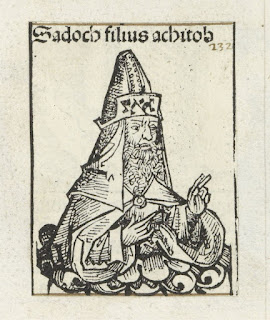"Even our repentance needs to be repented of. Our heart motivations are never pure." Woodcut illustration of Zadok
the High Priest, by Michel
Wolgemuth (1434 - 1519)
For some reason, the Twitterverse is all aflutter over this old tweet from Tim Keller. People don't like the thought that even our repentance is like "filthy rags" in the sight of God.
I'll let church historians argue the point of whether this is traditional Protestant theology.
But what I'd like to add to the discussion - as a Jewish follower of Jesus - is that this concept of "repenting of our repentance" is actually firmly rooted in the desert wilderness of the Exodus. From the mouth of God Himself. And that it's not a condemnation or a belittling of our faith, but rather a beautifully freeing extension of His grace.
Let me explain.
In Exodus 28, God steps in as master clothing designer, telling Moses - in great detail - what the High Priest's garments were supposed to be. From the turban on his head to the bells and pomegranates jingling at his feet, each and every thread was symbolic.*
It was the four "golden vestments" that set him apart from the other priests. Golden chains fastened onyx shoulder pieces to his ephod (vest), bearing the engraved names of the twelve tribes as he ministered. More golden chains suspended the breastpiece, with its twelve gemstones, over the High Priest's heart. And of course, there were those golden bells adorning the hem of his robe, announcing his presence before the King of Heaven. Or really, reminding him of the Holy One he was standing before.
But it's the last one of the golden vestments - the turban - that I want to talk about.
“Make a plate of pure gold and engrave on it as on a seal: HOLY TO THE LORD. Fasten a blue cord to it to attach it to the turban; it is to be on the front of the turban. It will be on Aaron’s forehead, and he will bear the guilt involved in the sacred gifts the Israelites consecrate, whatever their gifts may be. It will be on Aaron’s forehead continually so that they will be acceptable to the LORD. Exodus 28:36-38 NIV
The golden plate is what set the High Priest's turban apart. Holy to the Lord. But this wasn't a statement about the High Priest. It was a statement about us. Even our sacred gifts are tainted with sin. Whether it's wrong motivation or unconfessed - or unwitting - sin, our gifts to God are never perfectly pure.
But the beauty in this - going back to the beginning - is that He knows. God knows that we can't outrun our nature. That it's impossible for us to give a gift that is completely free from the radioactive nature of our sin. But He beckons us anyway. He accepts our gifts anyway. He delights in what we lay before Him, when we give it because of our delight in Him.
And how much more so can we see this, on this side of the Cross!
"...what was spoken through the prophet Isaiah might be fulfilled: He himself took our weaknesses and carried our diseases." Matthew 8:17 CSB
Unlike the earthly High Priest, Jesus really was "Holy to the Lord." Our Great High Priest is without blemish or spot, holy and perfect through and through. And bore us on His shoulders and over His heart as He offered the ultimate gift: Himself. The only gift ever given to God that didn't contain one iota of sin.
So now it's not just our gifts that are excused of sin, it's we ourselves - inside and out - freed from condemnation. In all things, we are able to give freely back to God in spite of ourselves. And the fact that He made it so - back in the wilderness and then on the Cross - is a gift of grace, not a declaration of condemnation.
Repenting of our repentance reminds us of where we stand: ever and always in need of forgiveness, and ever and always receiving it.
ⓒ 2022, Tammy L. Priest
*for more extensive discussion of the High Priest's symbolism (as well as that of the Tabernacle), you may be interested in my study, Rending the Curtain.
